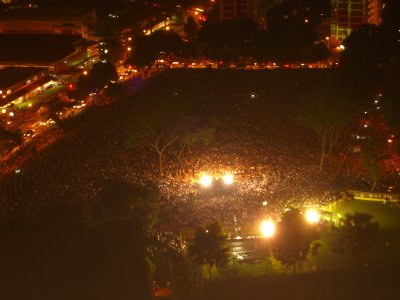 吹哨子 - whistle courtesy of Jing's Rally Pack, image by J, workers-party blue T-shirt by yoshitomo nara!
吹哨子 - whistle courtesy of Jing's Rally Pack, image by J, workers-party blue T-shirt by yoshitomo nara!The field was packed. But Jing's placard, duct taped to a wooden pole and declaring his love for Sylvia Lim ("I heart Sylvia Lim" on the one side, "Perseverence" on the other), did the trick. The uncles and aunties at Ang Mo Kio St.51 smelled the raw enthusiasm and clapped, as if welcoming a soldier returning from some battlefront. They made way for this young man to move towards the front of the crowd. Of course I followed behind - as did others who saw the opportunity to get a closer look at the Workers Party stage.
Ang Mo Kio is the destination of Workers Party's "kamikaze" attack on the incumbent Prime Minister. And I must admit that its young team, led by
Yaw Shin Leong spoke confidently and with conviction. Yaw was also unabashedly passionate. Early in his speech, he too declared his love, not for Sylvia Lim lah, but for Singapore. In the midst of explaining why he had agreed to lead this team, he said "because I, too, love Singapore!" The crowd cheered, clapped, blew their whistles.
This is something we seldom hear our politicians and leaders declare. They may declare their servant spirit. They may declare their gratitude to a meritocratic system. But they seldom declare their love.
Of course such emotive language is suspicious. We have been brought up, most of us, to distrust such declarations. This is the language of theatre - of political theatre, a populist strategy (at the other end of the spectrum is shouting insults), I concluded skeptically. Yet it was strangely moving and everyone wanted to believe his sincerity - because he was not only declaring his love, by extension, for the Singaporean audience, but
with the audience and also on their behalf! Such language is suspicious because it is precisely this powerful and expansive.
Of course, the highlight of that evening was WP's response to the incumbent Prime Minister's comment yesterday that by having 10 or 20 opposition MPs, parliamentary efficiency would be affected and a lower standard of governance would result.
But in the end, cut through all that stirring rhetoric - PAP or WP or SDA's: combative rhetoric, the rhetoric of statistics and cold empircism, the rhetoric of patriotism, the rhetoric of fear and blackmail - and I really wonder where all this leaves us in terms of this country's ability to address its diverse challenges and the growing internal divides. Does the opposition really understand the complexity behind every issue - which in Singapore's case, contains not just the domestic dimension, but our inextricable relationship with and dependency on the rest of the world? Does the PAP really think that having a stronger opposition representation at Parliament would diminish the rigour with which our policies are designed? Has the electorate, through all this, become a more informed electorate?
After the rally, Jing, L&G and I went for a bite at a nearby hawker centre. There, Jing's placard again proved useful and quickly secured us a table - albeit with a couple of half-drunk uncles.
The louder uncle of the 2 told us about his support for the Singapore Democratic Alliance and his anger at the government for the death of his niece (a doctor's oversight led to her death, but the court had ruled it a case of misadventure). We tried to tell him that that had nothing to do with the government - implicitly, don't blame the government for everything! But he said the court was appointed by the government. I didn't clarify that the judiciary was independent. He said if he was rich or if the one dead was the relative of a Minister, the court's verdict would have been different.
Then he reveals that he has been living in Queensland Australia for the past 6 years. Oh, how good life is there. There, he gets free treatment in the hospital. And he gets first-class treatment - he, a yellow-skinned man, gets first-class service from an
ang moh, a white-skinned ex-colonial master of his island.
He catches sight of the beer lady (G tells me she is an icon for this hawker centre), and calls out to her. There is some harmless flirting and she proceeds to kiss him. Oh, G said, she kisses everyone here! Ah, I thought, so full of love! Then she grabs the Workers Party flag and the placard beside Jing, stands up on the plastic chair, and starts to cheer - "Workers Party Workers Party". She steps down from the chair and plants a loud kiss on Jing; demands, "introduce your father to me leh!"
So much love. Enough to get us to Queensland Australia and back - from colony to independent nation and back again to this post-colonial indeterminate 3rd-or-1st-world we love, still marvelling after all these years when a white-skinned man condescends to be polite to us, yellow/brown/muddy-skinned Singapore.

 P/S: images from sgrally blogspot - if you see a tiny white square in the bottom photo, that's Jing's sign, with which he claims he will "whack" his young peers out of their apathy. Lucky I'm too old.
P/S: images from sgrally blogspot - if you see a tiny white square in the bottom photo, that's Jing's sign, with which he claims he will "whack" his young peers out of their apathy. Lucky I'm too old.




